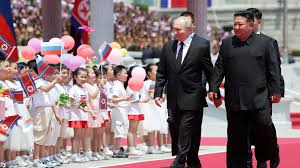A NATO-Style Defense Pact and an Image Boost: What Putin Gained from His North Korean Visit

20.06.2024: Vladimir Putin’s recent visit to North Korea, his first in nearly 25 years, has been closely watched globally. With the West observing intently, Russia’s optics were anything but subtle. Despite Putin’s increasing isolation and the risk of arrest in many countries due to an International Criminal Court warrant over his Ukraine invasion, he received a grand welcome in Pyongyang. Children waved Russian flags, and Putin’s giant portraits adorned Kim Il Sung Square, signaling to the world that Putin remains a valued ally in certain regions.
A Display of Solidarity
Unlike his interactions with China, where he might be seen as the junior partner, Putin’s visit to North Korea positioned him as an equal or even a senior figure. The rhetoric from both leaders and their “comprehensive strategic partnership pact” left no doubt about their shared objective: opposing the “imperialist policy of the United States and its satellites.” This pact, akin to NATO’s Article V, includes a clause for mutual assistance in case of aggression against either party.
Military Cooperation and Geopolitical Implications
Putin criticized the West for supplying F-16s and other weapons to Ukraine, indicating that Russia might develop military-technical cooperation with North Korea in response. This alliance, at a time of escalating tensions with neighboring countries and the West, raises several critical questions:
- Does this defense pact extend Russia’s nuclear deterrent to North Korea and vice versa?
- Will there be joint military drills or combined forces to protect their borders?
- Could other nations join this pact in the future?
Potential Military Support to Ukraine Frontlines
There’s an immediate concern that “military-technical cooperation” could result in North Korean missiles and shells reaching the front lines in Ukraine. Although both Moscow and Pyongyang deny such actions, Russia’s recent moves indicate otherwise. Previously, Russia backed UN sanctions preventing North Korea from exporting weapons but has now denounced these sanctions as “politically motivated.”
Strategic Messaging and Western Reactions
Russian state media didn’t miss the chance to mock the West’s reactions. National daily Moskovsky Komsomolets highlighted Western concerns over Putin’s visit, while Kremlin propagandist Vladimir Solovyov questioned why Americans are so concerned about Russia’s interactions with North Korea, even hinting at the severity of the global situation by stating, “we are already living in a Third World War.”
Moscow’s Strategic Calculations
Russia may believe that its nuclear threats alone are insufficient to stop Western support for Ukraine. This visit and the resulting defense pact coincide with the flow of U.S. weapons to Ukraine and the lifting of some restrictions on their use against Russia. While Russia might not want to explicitly fund or expand North Korea’s nuclear arsenal to avoid upsetting China, it aims to make the West think it’s willing to do so.
Putin’s visit to North Korea and the resulting defense pact significantly impact global geopolitics. The alliance strengthens Russia’s strategic position, boosts Putin’s image, and signals a united front against the West. As tensions escalate, the world watches closely, understanding that these developments could reshape international relations and security dynamics.
